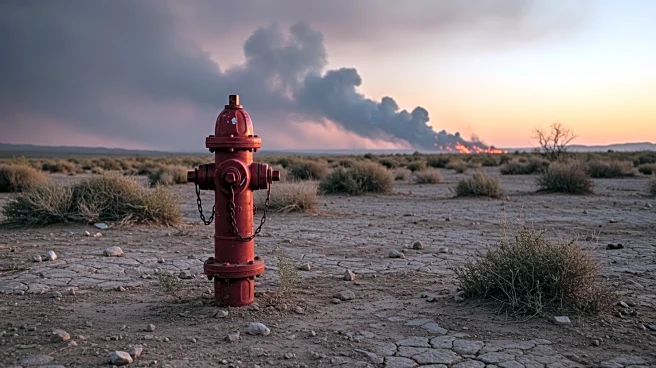What is the story about?
What's Happening?
The 2024 Texas wildfires, particularly the Smokehouse Creek and Windy Deuce Fires, have sparked significant regulatory and financial challenges for utility companies. The investigation led by Texas Attorney General Ken Paxton targets Xcel Energy, Osmose Utilities Services, and Southwestern Public Services Company, focusing on the potential neglect of infrastructure maintenance due to ESG (Environmental, Social, and Governance) priorities. The wildfires, which burned over a million acres and destroyed numerous homes, were linked to a utility pole managed by Xcel Energy. Although the company acknowledged its facilities' involvement, it denied negligence. The probe has intensified scrutiny on ESG-aligned energy stocks, questioning whether they can withstand regulatory pressures prioritizing infrastructure reliability over ESG agendas. Xcel Energy faces $300 million in damage claims, with its stock price dropping 4.5% and market capitalization falling to its lowest since 2018.
Why It's Important?
This development highlights the growing tension between ESG initiatives and regulatory accountability in the energy sector. The Texas wildfires underscore the potential financial and reputational risks for companies prioritizing ESG over operational safety. The case reflects a broader trend where regulators are increasingly holding companies accountable for tangible harms rather than abstract sustainability goals. This situation poses significant challenges for investors, as anti-ESG legislation in states like Texas and Florida, along with federal proposals, create a fragmented regulatory landscape. Companies with aggressive ESG commitments but weak infrastructure maintenance records face heightened risks of litigation and financial exposure, as demonstrated by the $240 million settlement in the Signet Jewelers case over DEI misstatements.
What's Next?
Investors are advised to reconsider their strategies, potentially divesting from high-risk ESG-linked utilities like Xcel Energy. The Texas probe suggests that ESG initiatives can backfire if they compromise operational safety. Investors might hedge with energy infrastructure firms that have robust regulatory compliance frameworks and diversified energy portfolios. Monitoring state-level anti-ESG legislation and federal climate disclosure rules will be crucial, as these could force utilities to disclose liabilities previously hidden in ESG reports. The SEC's proposed climate risk reporting standards could further impact how utilities manage and disclose their ESG-related risks.
Beyond the Headlines
The Texas wildfires reveal the fragility of ESG-aligned energy stocks in a regulatory environment increasingly skeptical of ideological commitments over tangible outcomes. While ESG initiatives are vital for long-term sustainability, the risk of regulatory backlash demands a recalibration of investment strategies. The market is beginning to recognize that ESG is no longer a shield against accountability, and companies must balance their sustainability goals with operational reliability to avoid financial and reputational damage.
















